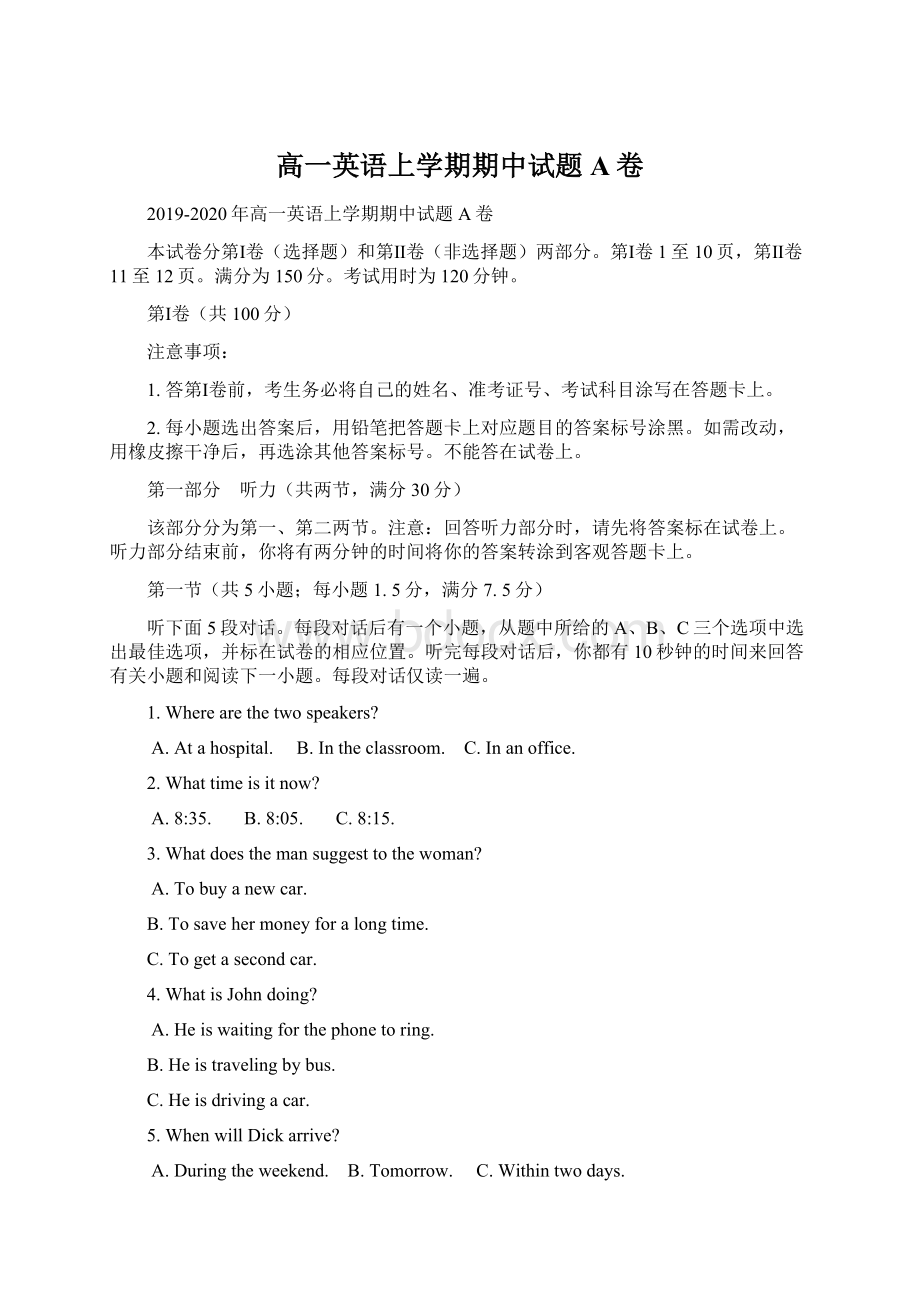 高一英语上学期期中试题A卷.docx
高一英语上学期期中试题A卷.docx
- 文档编号:6947397
- 上传时间:2023-01-13
- 格式:DOCX
- 页数:12
- 大小:26.35KB
高一英语上学期期中试题A卷.docx
《高一英语上学期期中试题A卷.docx》由会员分享,可在线阅读,更多相关《高一英语上学期期中试题A卷.docx(12页珍藏版)》请在冰豆网上搜索。

高一英语上学期期中试题A卷
2019-2020年高一英语上学期期中试题A卷
本试卷分第Ⅰ卷(选择题)和第Ⅱ卷(非选择题)两部分。
第Ⅰ卷1至10页,第Ⅱ卷11至12页。
满分为150分。
考试用时为120分钟。
第Ⅰ卷(共100分)
注意事项:
1.答第Ⅰ卷前,考生务必将自己的姓名、准考证号、考试科目涂写在答题卡上。
2.每小题选出答案后,用铅笔把答题卡上对应题目的答案标号涂黑。
如需改动,用橡皮擦干净后,再选涂其他答案标号。
不能答在试卷上。
第一部分 听力(共两节,满分30分)
该部分分为第一、第二两节。
注意:
回答听力部分时,请先将答案标在试卷上。
听力部分结束前,你将有两分钟的时间将你的答案转涂到客观答题卡上。
第一节(共5小题;每小题1.5分,满分7.5分)
听下面5段对话。
每段对话后有一个小题,从题中所给的A、B、C三个选项中选出最佳选项,并标在试卷的相应位置。
听完每段对话后,你都有10秒钟的时间来回答有关小题和阅读下一小题。
每段对话仅读一遍。
1.Wherearethetwospeakers?
A.Atahospital.B.Intheclassroom.C.Inanoffice.
2.Whattimeisitnow?
A.8:
35.B.8:
05.C.8:
15.
3.Whatdoesthemansuggesttothewoman?
A.Tobuyanewcar.
B.Tosavehermoneyforalongtime.
C.Togetasecondcar.
4.WhatisJohndoing?
A.Heiswaitingforthephonetoring.
B.Heistravelingbybus.
C.Heisdrivingacar.
5.WhenwillDickarrive?
A.Duringtheweekend.B.Tomorrow.C.Withintwodays.
第二节(共15小题;每小题1.5分,满分22.5分)
听下面5段对话或独白。
每段对话或独白后有几个小题,从题中所给的A、B、C三个选项中选出最佳选项,并标在试卷的相应位置。
听每段对话或独白前,你将有时间阅读各个小题,每小题5秒钟;听完后,各小题给出5秒钟的作答时间。
每段对话或独白读两遍。
听第6段材料,回答第6至8题。
6.Whatisthemangoingtodo?
A.Hewantstovisitthetheatre.
B.HewantstomeetShakespeare.
C.HewantstomeetShakespeare’splay.
7.Wheredothetwospeakerscomefrom?
A.OneisfromEngland,andtheotherisfromFrance.
B.TheycomefromEngland.
C.BothofthemcomefromFrance.
8.WhichisWRONGaccordingtothedialogue?
A.BothofthemlikeShakespeare’splay.
B.Themandoesn’tlikegoingtherebecauseofthelongway.
C.Themanknowswhoseplayisonthetheatre.
听第7段材料,回答第9至11题。
9.HowdidMrs.SmithfeelwhenshesawMr.White?
A.Surprised.B.Exited.C.Sad.
10.HowdoesMrs.Smithfeelabouttravelingbyair?
A.Shedoesn’tenjoyflyingmuch.
B.Shethinksflightisoftendelayedbecauseoftheweather.
C.Shelikesit.
11.WhatdoesMr.Whitegototheairportfor?
A.Tocatchtheflight.B.ToseeMr.Smithoff.C.Tobookaflightticket.
听第8段材料,回答第12至14题。
12.Whatdoweknowabouttheboy?
A.Hewenttothesupermarketyesterday.
B.Healwayscan’tfindhisexerisebook.
C.Heoftenforgetstohandinhisexerisebook.
13.Whatdoesthewomanthinkoftheboy?
A.Heisoptimistic.B.Heisbright.C.Heishonest.
14.Whatisthepossiblerelationshipbetweenthespeakers?
A.MotherandsonB.Sisterandbrother.C.Teacherandstudent.
听第9段材料,回答第15至17题。
15.Wheredoesthemanoftenshop?
A.FromtheTV.B.Inthestores.C.OntheInternet.
16.HowmuchwillthemanpayforthecellphoneifhebuysitontheInternet?
A.$300.B.$900.C.$1200.
17.WhatdoesthemanprobablythinkofpayingbycreditcardontheInternet?
A.Itisnotsafe.B.Itispopular.C.Itisattractive.
听第10段材料,回答第17至20题。
18.What’sthebestwaytofindmistakes?
A.Tokeepadiaryandwritenotesorlettersandsoon.
B.Totryyourbesttospeak.
C.Don’tbeafraidofmakingmistakes.
19.Whatkindofbooksyoushouldnotchoosewhenyouread?
A.Interestingbooks.B.Toodifficultbooks.C.Importantbooks.
20.Whenyoufindsomenewwordsinreadingwhatshouldyoudo?
A.Guesstheirmeaningsfirst.
B.Goonreading.
C.Stoptolookthemupinthedictionaryatonce..
第二部分阅读理解(共两节,满分40分)
第一节(共15小题;每小题2分,满分30分)
阅读下列短文,从每题所给的四个选项(A、B、C和D)中,选出最佳选项。
A
Friendisbetterthanfortune.Friendisworsethanpoisoninsomecases.Thetwosentencesaboveareoppositeandseemtobeunreasonablebuttheycanbeexplainedasfollows:
thefirstreferstoallgoodfriendswhodriveustowardsgoodwhilethesecondallbadoneswholeadustowrongways.
Myideal(理想的)friendisofcourseagoodfriendwhosegoodnessisshownbelow—hehasnobadlikings,suchassmokinganddrinking.Helivesinfrugality(节俭).Hestudieshardsoasnottowastehisgoldentime.Athomehehonorshisparentsandloveshisbrothers;atschoolherespectshisteachersandsharesfeelingsofhisclassmates.Hetreatsthosetrulywhoaretruetohim.Inaword,hehasallthegoodcharactersbetterthanmine.Icanfollowhimasamodel.WithhishelpIamfreefromalldifficulties.
Indeed,ifIhavesuchapersonasmyfriend,IshallneverfeardifficultyandIshallneverknowtheexistenceoftheword“failure”.
21.Thispassagetellsus.
A.howtomakefriendswithothers
B.howthewriter’sfriendhelpshim
C.whatkindofpersonthewriter’sfriendis
Dwhatkindofpersonweshouldmakefriendswith
22.Anidealfriendmeans .
A.atruefriend B.afalsefriend
C.animaginaryfriend D.anexcellentfriend
23.Fromthepassagewecanlearnthat .
A.thewriterandhisidealfriendhavealottolearnfromeachother
B.thewriterhasalottolearnfromhisidealfriend
C.thewriter’sidealfriendhasalottolearnfromhim
D.thewriterhasonlyalittletolearnfromhisidealfriend
B
Realfriend,realmeaning
Wecanmakemistakesatanyage.Somemistakeswemakeareaboutmoney.Butmostmistakesareaboutpeople.“DidJerryreallycarewhenIbrokeupwithHelen?
”“WhenIgotthatgreatjob,didJimreallyfeelgoodaboutit,asafriend?
Ordidheenvymyluck?
”Whenwelookback,doubtslikethesecanmakeusfeelbad.Butwhenwelookback,it’stoolate.
Whydowegowrongaboutourfriendsorourenemies?
Sometimeswhatpeoplesayhidestheirrealmeaning.Andifwedon’treallylisten,wemissthefeelingbehindthewords.Supposesomeonetellsyou,“You’realuckydog.”that’sbeingfriendly.But“luckydog”?
There’sabitofenvyinthosewords.Maybehedoesn’tseeithimself.Butbringinginthe“dog”bitputsyoudownalittle.Whathemaybesayingisthathedoesn’tthinkyoudeserveyourluck.
“Justthinkofallthethingsyouhavetobethankfulfor”isanothernoisethatsaysonethingandmeansanother.Itcouldmeanthatthespeakeristryingtogetyoutoseeyourproblemaspartofyourlifeasawhole.Butishe?
Wrappedupinthisphraseisthethoughtthatyourproblemisn’timportant.It’stellingyoutothinkofallthestarvingpeopleintheworldwhenyouhaven’tgotadateforSaturdaynight.
Howcanyoutelltherealmeaningbehindsomeone’swords?
Onewayistotakeagoodlookatthepersontalking.Dohiswordsfitthewayhelooks?
Doeswhathesaysagreewiththetoneofvoice?
Hisposture(姿态)?
Thelookinhiseyes?
Stopandthink.Theminuteyouspendthinkingabouttherealmeaningofwhatpeoplesaytoyoumaysaveanothermistake.
24.Whenwelistentoapersontalking,themostimportantthingforusisto________.
A.noticehisbodylanguagewhenthepersonistalking
B.lookathisfaceandnoticehisexpression
C.payattentiontohistoneandhisposture
D.judgetherealmeaningfromhisspeechandbehavior
25.Accordingtotheauthor,thereasonwhywegowrongaboutourfriendsisthat________.
A.wefailtolistencarefullywhentheytalk
B.wesometimesdon’tbelievewhatourfriendssay
C.wearetiredofwhattheysay
D.peopleusuallystateonethingbutmeananother
26.WhichofthefollowingsentencesisTRUEaccordingtothepassage?
A.Perhapshewisheshimselftohavethesamesituationasyouwhenhesays“youarealuckydog”.
B.Mostmistakesweusuallymakeareaboutmoney.
C.Thereisonlyonewaytotelltherealmeaningbehindsomeone’swords.
D.It’snotworthspendingtimeingettingsomeone’srealmeaning.
27.Thispassageismainlyabout.
A.whattodowhenyoulistentoothers
B.howtoavoidmistakeswhenyoucommunicatewithpeople.
C.whichkindofmistakeyoucanmakewhenyouaretalkingtoothers
D.whywegowrongwithpeople
C
TheEnglishlanguagestartedabout1,500yearsagoinEngland.Threegroupsofpeoplecametothecountry. TheyweretheAngles, theSaxons, andtheJutes.ThesethreegroupsbroughttheirlanguageswiththemtoEngland.Aftersometime,thethreelanguagesbecameonenewlanguageEnglish.Thename“English”comesfromtheAngles.Theylivedinmostof“England”.Englandmeans“AngleLand”or“CountryoftheAngles”.
Thelanguagethatwespeaktoday-ModernEnglish-isnotthesameastheEnglishthatpeopleusedmanyyearsago,includingOldEnglish(before1150)andMiddleEnglish(uptill1500).Thatlanguage—OldEnglish—soundsdifferent,andithassomedifferentrulesofgrammar.TherewereonlyafewthousandwordsinOldEnglish.ButModernEnglishdoescomefromOldEnglish,anditisstilllikeitinmanyimportantways.
28.WhendidModernEnglishstart?
A.Abouttheyear1150.
B.Beforetheyear1500.
C.Betweenthe12thcenturyandthe16thcentury.
D.Abouttheyear1500.
29.HowmanylanguagesdidOldEnglishcomefrom?
A.One.B.Two.C.Three.D.Four.
30.Whichlanguagedidthename“English”comefrom?
A.ModernEnglish.B.TheAngles.C.TheJutes.D.TheSaxons.
31.Accordingtothepassage,ModernEnglishdiffersfromOldEnglishin_______.
A.grammarB.pronunciationC.wordsD.alloftheabove
D
LastweekmyyoungestsonandIvisitedmyfatherathisnewhomeinTucson,Arizona.Hemovedthereafewyearsago,andIwaseagertoseehisnewplaceandmeethisfriends.
Myearliestmemoriesofmyfatherareofatall,handsome,successfulman,devotedtohisworkandfamilybutuncomfortablewithhischildren.AsachildIlovedhim;asaschoolgirlandyoungadult(成年人)Ifearedhimandfeltbitter(痛苦的)abouthim.HeseemedunhappywithmeunlessIgotstraight“As”andunhappywithmyboyfriendsiftheirfatherswerenotas“successful”ashewas.WheneverIwentoutwithhimonweekends,Iusedtostruggletothinkupthingstosay,feelingonguard.
Onthefirstdayofmyvis
- 配套讲稿:
如PPT文件的首页显示word图标,表示该PPT已包含配套word讲稿。双击word图标可打开word文档。
- 特殊限制:
部分文档作品中含有的国旗、国徽等图片,仅作为作品整体效果示例展示,禁止商用。设计者仅对作品中独创性部分享有著作权。
- 关 键 词:
- 英语 学期 期中 试题
 冰豆网所有资源均是用户自行上传分享,仅供网友学习交流,未经上传用户书面授权,请勿作他用。
冰豆网所有资源均是用户自行上传分享,仅供网友学习交流,未经上传用户书面授权,请勿作他用。


 对中国城市家庭的教育投资行为的理论和实证研究.docx
对中国城市家庭的教育投资行为的理论和实证研究.docx
